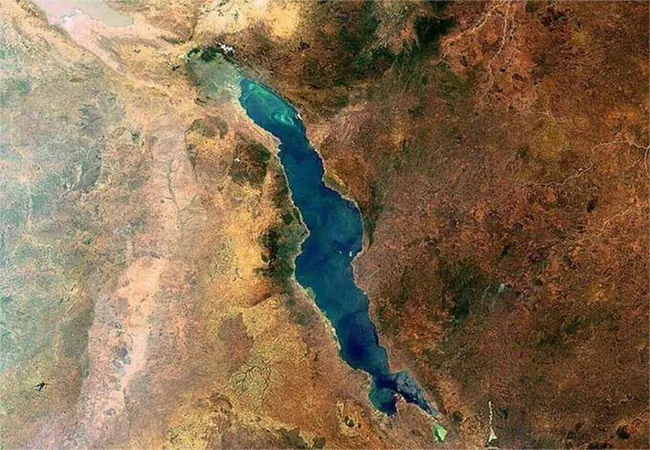
A New Ocean Forming in East Africa: Geological Revelations That Could Change Everything!
2024-12-30
Author: Wai
A New Ocean Forming in East Africa: Geological Revelations That Could Change Everything!
The African continent is on the brink of a revolutionary geological transformation that has caught the attention of scientists and researchers worldwide. In a fascinating twist, new studies indicate that the formation of a new ocean basin in East Africa could occur much sooner than previously estimated. This dramatic geological activity raises huge questions about the future of Africa’s landscape and ecosystem.
Unprecedented Tectonic Movements Reshaping Africa’s Landscape
At the heart of this remarkable change lies the East African Rift System, an extensive network of faults and valleys stretching from Mozambique to the Red Sea. Researchers are closely monitoring the movement of the African and Somali tectonic plates, which are gradually drifting apart at an impressive rate of approximately 0.8 centimeters per year. This shift is creating a massive rift that could signify the foundation of a new ocean.
Cynthia Ebinger, a distinguished geoscientist from Tulane University, has dedicated decades to studying this phenomenon. Her groundbreaking research has revised earlier timelines, now suggesting that the formation of a new ocean could unfold within a remarkably short period of around 1 million years—perhaps even half that time! Ebinger asserts, “A major earthquake could further accelerate the process,” though the unpredictable nature of seismic activity poses challenges for precise predictions.
Historical Seismic Events and Their Impact
The geological discourse took a significant turn in 2005 when a series of 420 earthquakes struck Ethiopia, leading to an astonishingly rapid geological development. In a matter of days, a fissure formed in the Afar region—a process that typically unfolds over centuries. This groundbreaking event has prompted scientists to re-evaluate their understanding of geological timeframes.
Currently, the East African Rift stretches approximately 60 kilometers, plunging to depths of around 10 meters in the Ethiopian desert, a region where temperatures soar to 50 degrees Celsius and rainfall can be absent for up to nine months. These extreme conditions provide a rare laboratory for studying tectonic processes in real-time.
The birth of this potential new ocean basin bears resemblances to the ancient formation of the Atlantic Ocean, as this is one of the few locations on Earth where continental crust is actively evolving into oceanic crust—a phenomenon witnessed by researchers around the globe.
Global Implications of Africa's Emerging Ocean
The prospect of an entirely new ocean could radically alter the geography and ecosystems of East Africa. Landlocked nations such as Zambia and Uganda might soon find themselves with coastlines, fundamentally changing their economic outlook and environmental conditions. The implications of this geological shift are extensive, prompting a wealth of scientific inquiry into how these changes will reshape the continent.
Moreover, these transformations challenge our conventional understanding of Earth's dynamic nature. The rapid geological changes in East Africa serve as a stark reminder that our planet is never static, but in a continuous state of transformation.
The Scientific Frontier: Challenges Ahead
Despite the thrilling potential for discoveries, the accelerated timeline for the formation of a new ocean also presents hurdles for the scientific community. Researchers are tasked with:
- Developing sophisticated models for predicting geological changes,
- Enhancing monitoring techniques for seismic activities,
- Evaluating potential environmental impacts stemming from a new ocean basin,
- Understanding socio-economic ramifications for impacted regions.
These research initiatives require a collaborative effort, intertwining geology, oceanography, environmental science, and social implications. Consequently, the scientific community’s commitment to address these challenges exemplifies the innovative spirit that propels modern geological research.
As researchers continue to unravel the complexities of this phenomenon, they not only solve intricate puzzles but also broaden our comprehension of Earth’s geological processes. The prospect of a new ocean forming in East Africa constantly reminds us that our planet is in a perpetual state of flux, with significant changes occurring over both vast and surprisingly brief timescales.
Stay tuned as scientists delve deeper into this phenomenon, unlocking secrets that may redefine our understanding of Earth’s future geography!

 Brasil (PT)
Brasil (PT)
 Canada (EN)
Canada (EN)
 Chile (ES)
Chile (ES)
 Česko (CS)
Česko (CS)
 대한민국 (KO)
대한민국 (KO)
 España (ES)
España (ES)
 France (FR)
France (FR)
 Hong Kong (EN)
Hong Kong (EN)
 Italia (IT)
Italia (IT)
 日本 (JA)
日本 (JA)
 Magyarország (HU)
Magyarország (HU)
 Norge (NO)
Norge (NO)
 Polska (PL)
Polska (PL)
 Schweiz (DE)
Schweiz (DE)
 Singapore (EN)
Singapore (EN)
 Sverige (SV)
Sverige (SV)
 Suomi (FI)
Suomi (FI)
 Türkiye (TR)
Türkiye (TR)
 الإمارات العربية المتحدة (AR)
الإمارات العربية المتحدة (AR)